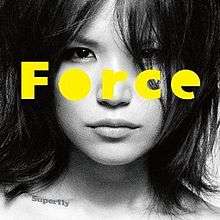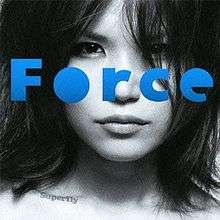Freeze
Freeze may refer to:
Liquids turning to solids
Cessation of movement or change
Music
Acts
Albums
Songs
Freeze!
Freeze! is a puzzle video game developed by Frozen Gun Games and released in November 2012 for iOS and Android. The game reached the top of the Apple App Store in 61 countries. It received several awards and has downloaded over ten million copies. The idea and gameplay is developed by Andreas von Lepel, who designed various games for the Commodore 64, Amiga and Game Boy in the early 80s. The artwork with its dark, atmospheric images was designed by Jonas Schenk.
Gameplay
As a small round hero in eye shape it is necessary to solve different puzzles. The player does not control the character itself, but the prison cells. With the "Freeze" Button the gravity can be deactivated and the eye remains in its place. The cells can be turned to the right position. If you activate the gravity again, the eye drops in the adjusted direction. Deadly stings and various enemies complicate the levels.
Reception
The game won Casual Games Association´s Indie Prize Europe 2013 award. It is also one of the ten best games in 2013 of the Android Quality Index. The game received "generally favorable" reviews, according to video game review score aggregator Metacritic.

Freeze (album)
Freeze is the tenth studio album by Dutch rock and roll and blues group Herman Brood & His Wild Romance. The album reached #63 on the Dutch album chart on 3 November 1990, and stayed on the chart for 5 weeks. Brood, who had just won the 1989 Popprijs, one of the highest Dutch awards for popular music, recorded Freeze with the help of Clarence Clemons of the E Street Band and Tejano accordion player Flaco Jiménez. Lack of success for this album leads Brood to stop touring.
Track listing
Personnel
References

Force (Superfly album)
Force is the fourth studio album by Japanese pop-rock unit Superfly. It was released on September 19, 2012. Force commemorates the group's fifth anniversary and was released in several formats, including a special fifth anniversary edition which includes a bonus CD (included with the first-press releases), a vinyl version of the album, and a commemorative poster. Japanese convenience store Lawson will also exclusively sell a special edition of the album which includes a bonus DVD. On the iTunes Store, the album will be packaged with one bonus track, with a second reserved for those who pre-ordered the album.
The album's title comes from both the English word "force" as well as the similarity between the Japanese pronunciations of "force" and "fourth".
To support Force, Superfly is going on two separate tours, the "Live Force" national concert hall tour from October 2012 through January 2013 and the tentatively titled "Superfly Arena Tour 2013" in March and April 2013.

Force (song)
"Force" is a song by Japanese rock unit Superfly. It is a song from the album of the same name, serving as its title track. It is being released as a re-cut single on October 31, 2012. The song, on its own, is used as the theme song for the TV Asahi drama Doctor X, and as a radio single reached 46 on the Billboard Japan Hot 100.
Track listing
References
External links

The Force (Star Wars)
The Force is a binding, metaphysical, and ubiquitous power in the fictional universe of the Star Wars franchise created by George Lucas. Introduced in the first Star Wars film (1977), it is wielded primarily by the Jedi and Sith monastic orders and is a part of all subsequent Star Wars works, including the Star Wars Legends collection of comic books, novels, and video games. The line "May the Force be with you", spoken in each of the Star Wars films, has become part of the pop culture vernacular and is iconic of the series.
Depiction
In the original Star Wars film (1977), later dubbed A New Hope, the Force is first described by Jedi Master Obi-Wan Kenobi:
Throughout the series, characters exhibit various paranormal powers that rely on the Force, such as telekinesis and empathy. The Force has a negative and destructive aspect called the "dark side", which feeds off emotions such as fear, anger, greed, pride, jealousy and hate. Jedi Master Yoda explains to his pupil Luke Skywalker in The Empire Strikes Back (1980):
Podcasts:

